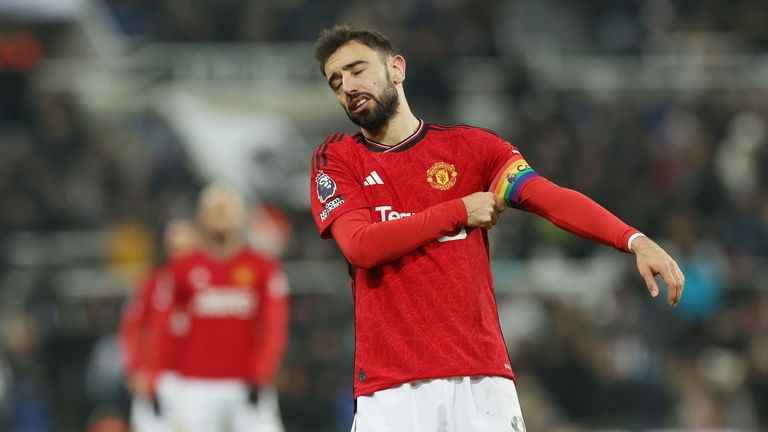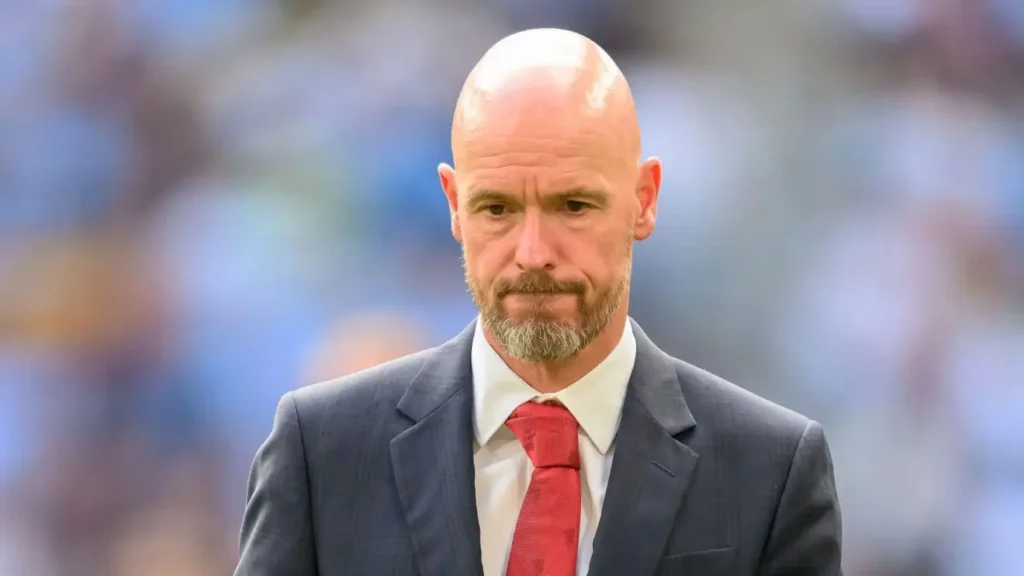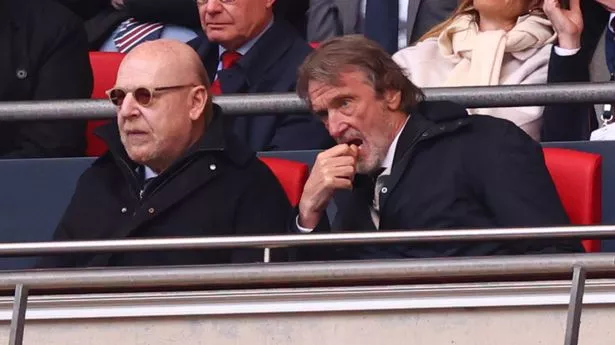Who is to Blame for United’s Struggles: Players, Coach or Executives?

Manchester United owner, Sir Jim Ratcliffe. Photo Credit: Skysports
Manchester United’s 2024/25 campaign has been filled with disappointing performances on the pitch, inconsistent results and a growing divide between fans and the club’s leadership. Once synonymous with dominance and success, the club now finds itself battling mediocrity. The question of blame has become the bone of contention as fingers now point at players, former manager Erik ten Hag, and the club’s executives. This opinion piece is set to analyze the contributions of all three groups.
United’s Players: A Crisis of Commitment and Quality

I do not not know how appropriate to start but it would not be bad to start with the blame on United’s current squad. At the heart of United’s struggles lies a squad that has often underperformed this season. Despite significant investments in players like Casemiro, Mason Mount, Jadon Sancho, and Antony, the team’s performances lack cohesion and intensity.
Key Issues
The absence of strong, vocal leaders like the club once had in Roy Keane, Rui Ferdinand or Nemanja Vidić has been glaring. Bruno Fernandes, while talented and showing his footballing ability, has often faced criticism from both fans and pundits alike for his attitude and body language on the pitch, often seeming to complain rather than put the team together to focus on winning games.
In addition, the issues of high-profile players like Antony, Mason Mount, and Casemiro have not justified their hefty price tags or wages this season. Casemiro, in particular, has been defensively vulnerable, and Mount has struggled to adapt to either former manager Ten Hag’s system or that of the new manager Ruben Amorim.
Furthermore, a recurring critique is the team’s lack of fight and motivation in crucial moments on the pitch. Players like Alejandro Garnancho appear to show less confidence playing on the pitch or uninspired before opposition teams, which can be said to be unacceptable for a club of United’s stature.
However, blaming only the players overlooks systemic issues. Many argue that the squad lacks depth in key areas, especially in defense and attack, which has left players overburdened and fatigued. Injuries to Luke Shaw and Tyrell Malacia have these problems become worse, further exposing weaknesses in squad planning.
READ ALSO
Between Player’s Passion, Faith and the Premier League LGBTQ+ Campaign
Amad Diallo: Man United prodigy’s transition to global sensation
From mockery to Man U hero: Can André Onana Win EPL Golden Glove?
Rúben Amorim: Five areas Man United’s new coach must fix to succeed
Erik ten Hag: The Manager’s Share of the Blame

Although he has parted ways with the club, critics still put him in discussion on the recent struggles facing United. Erik ten Hag entered Old Trafford with high expectations following his success at Ajax, but his second season has been far from smooth. The Dutchman initially impressed by restoring discipline and securing a top-four finish at the end of the 2022/23 campaign, but 2023/24 season and early this season has highlighted some glaring managerial flaws.
Key Issues
The handling of individuals like Jadon Sancho and Antony has caused unnecessary distractions. Sancho’s public fallout with the manager has created unrest, and Ten Hag’s continued trust in underperforming players has frustrated fans.
Furthermore, United have been unable to build momentum, often losing games they are expected to win. The lack of tactical experience against top teams has also been exposed, as seen in defeats to Liverpool and Arsenal this season.
However, to Ten Hag’s credit, he inherited a broken squad plagued by years of mismanagement. The culture of entitlement and complacency that predates his tenure cannot be fixed overnight. Additionally, injuries to key players like Luke Shaw and Lisandro Martinez last season have hindered his ability to field a consistent lineup, often settling for players without the experience in those positions.
The Executives: The Root of the Problem?

Following the recent downturn of events in United, I may be compelled to affirm this assertion that arguably the biggest culprits behind United’s decline are the club’s executives and owners. Initially under the Glazer family’s ownership, Manchester United has become a symbol of mismanagement and misplaced priorities and has the takeover by Sir Jim Ratcliffe with INEOS last year, the blame has shifted hands from the Glazer’s family to now INEOS CEO, Ratcliffe, with many claiming that Ratcliffe could make similar mistakes made by the Glazers when in charge.
Key Issues
Despite spending over £400 million since Ten Hag’s arrival, many signings have failed to meet expectations. This reflects a deeper problem with the club’s scouting and recruitment strategy, which often seems reactive rather than proactive. United’s ownership especially when it was under the Glazer’s family gave more priority on commercial revenue over building a solid footballing project. This has left the club trailing rivals like Manchester City, who boast a clear vision and strategy.
The saga surrounding the Glazers’ partial sale has further alienated fans. The lack of transparency and delay in resolving the ownership situation had become a factor that created uncertainty and instability within the club.
Regardless of the fact that the Glazers and now Ratcliffe deserve criticism on their management of the club affairs, they have provided significant funds for transfers. The blame also lies with how those funds have been used, highlighting inefficiencies in the club’s footballing operations.
Who Is Ultimately to Blame?
Addressing the big question that has been set before fans, pundits and the overall footballing world “who is to blame solely between the players, the manager or the club executives”. Manchester United’s problems seems numerous and varied in more dimensions that cannot be easily understood, making it impossible to assign blame to one group entirely.
The Players bear responsibility for their lack of intensity and failure to deliver consistent performances. As opposed to the big wages and price tags, they have offered little in contributing to the club’s growth and development, infuriating fans.
Erik ten Hag has shown tactical limitations and struggled with man-management, but he remains a competent coach dealing with a flawed squad. However, his dismissal from the club and the arrival of Amorim has been heralded to begin a new era for the club, but that is an expectation that cannot come suddenly.
The Executives and ownership, perhaps, are the root cause. Years of mismanagement, poor recruitment, and neglecting footballing priorities have left the club in disorganized and not having its stance as a football powerhouse.
The Path Forward
For Manchester United to return to their glory days, systemic changes are essential. This includes a clear footballing vision, better recruitment, and empowering the manager with the tools to succeed. Until the Ratcliffe and members of the INEOS board fully address these issues, the club will likely remain stuck in its cycle of mediocrity.

